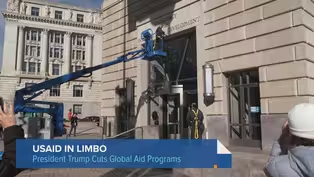
New Book Unlocks Secrets of Life in Earth's Most Extreme Environments
Clip: 2/10/2025 | 7m 13sVideo has Closed Captions
Paleontologist and author Neil Shubin has been on multiple expeditions to the Arctic and Antarctica.
University of Chicago paleontologist and author Neil Shubin has been on multiple expeditions to the Arctic and Antarctica. Those trips have produced groundbreaking discoveries about the evolution of life — including the “missing link” fossil Tiktaalik roseae.
Problems playing video? | Closed Captioning Feedback
Problems playing video? | Closed Captioning Feedback
Chicago Tonight is a local public television program presented by WTTW
WTTW video streaming support provided by members and sponsors.

New Book Unlocks Secrets of Life in Earth's Most Extreme Environments
Clip: 2/10/2025 | 7m 13sVideo has Closed Captions
University of Chicago paleontologist and author Neil Shubin has been on multiple expeditions to the Arctic and Antarctica. Those trips have produced groundbreaking discoveries about the evolution of life — including the “missing link” fossil Tiktaalik roseae.
Problems playing video? | Closed Captioning Feedback
How to Watch Chicago Tonight
Chicago Tonight is available to stream on pbs.org and the free PBS App, available on iPhone, Apple TV, Android TV, Android smartphones, Amazon Fire TV, Amazon Fire Tablet, Roku, Samsung Smart TV, and Vizio.

WTTW News Explains
In this Emmy Award-winning series, WTTW News tackles your questions — big and small — about life in the Chicago area. Our video animations guide you through local government, city history, public utilities and everything in between.Providing Support for PBS.org
Learn Moreabout PBS online sponsorshipconversation.
Where going to the polls know not to vote.
We mean the polls of the Earth University of Chicago paleontologist and author Neil Shubin has been on multiple expeditions to the Arctic and Antarctica.
Those trips have produced groundbreaking discoveries about the evolution of life, including the missing link fossil to.
Now is out with a new book that celebrates the incredible variety of scientific research and discovery in these extreme environments.
The book is called ends of the Earth journeys to the polar regions in search of life.
The cosmos and our future and Neil Shubin is back with more.
Welcome back.
Good to see you.
It's great to be here How many polar expeditions have you been on now?
I've been doing it for over 3 decades.
So probably about 25 of them.
So you started your baby?
Yeah.
Exactly.
Like 6 So in this book you write about your first expedition to Greenland in 1988.
Looking for fossils >> what are the challenges?
The dangers of conducting research in such remote really inhospitable to human kind of places.
For me, the biggest challenges I didn't camp much before.
I think Rob is a camp or anything like that.
No outdoor experience.
And so here I am taking a small plane for a 3 hour ride to Greenland with a bunch of with 3 other experts who really continue what they're doing.
Fortunately, when you work in these places that temperature can be, you know, 0 to -20 Fahrenheit.
You're living in a nylon 10 for 4 to 6 weeks.
It's daylight 24 hours a day and some are dark.
24 hours a day and winter, they're polar bears.
Polar bears, eat people.
You know, there's a lot of stuff and all the food has to come in.
Logistics is really important.
You may be 30400 miles from other people.
So it's really remote, really extreme.
That the conditions can be really harsh.
And you have to know you're doing not only survive there, but to do the science.
And I would imagine you have to be ready because the weather can turn on you at any point.
You kind of have to be ready for everything, you know, because you make plans to work in these places and by the time you hit the ground, the weather can change the planes and helicopters can have mechanical problems.
So you really have to be able to adjust on the fly to make an expedition work.
So it might be tempting to think that, you know, the challenges of working in both the Arctic and the Antarctic are pretty similar right essentially the same.
But you write that your experience to the Arctic was a quaint family camping trip.
>> Yeah.
Compared to the Antarctic.
Why is the Antarctic the South Pole so much more difficult?
More time?
Yeah, I mean, my trip to the Arctic was was was like being in the Bahamas compared all things that will.
Antarctica is a continent.
>> So as land the Arctic is not.
And that's a big difference.
So with the Antarctic, what you have is Syriza mountains, the pokes through the ice and the ice can be at 7,000 to 10,000 feet.
So you're at high altitude, you know, surrounded by thousands of miles of ice.
You know, it is a con at the size of North America.
So it's colder, windier and drier than the Arctic, at least in the places we've worked.
So it's much more extreme.
It's larger.
So you have to really, you know, travel over long distances.
You know, it's a whole different kettle of fish working in Keller, fossil you did there.
Yeah, that's interesting.
>> So tell us about the range of science.
It's being conducted in polar regions in the importance of some of those scientific discoveries.
Yeah, you know, working in polar regions and this is what I want to capture in the book changes the way we see the world.
really does because there's so much science about there that tells us about our past our present our future.
You have people looking at the rocks and of and Antarctica below the ice or even exposed.
But tell us about ancient environments about what the polls looked like millions of years ago and how ice actually form.
We have people working on satellites to tell us about the movement of the eyes.
We have people working on meteorites which tell us about the origin of the cosmos.
There are telescopes in the clear air of the polar world.
But tell us about the origin of the of the cosmos of the of the universe since the Big Bang.
So it's science that tells us about ourselves.
Our biology, our history, the planet, and the cosmos.
It's a remarkable stories and so privileged to tell them you a few examples that you write about.
You mentioned ancient environments, for example, there was what water found.
How many, how far?
>> Into the the surface when you go to the center of the ice cap, you can go 2 and a half miles below the surface of the eye of the ice.
There are lakes lakes, the size of Lake Ontario.
There are about 600 lakes below the ice miles below the ice Antarctica.
And it gets even stranger.
>> When you look inside the water of that ice, you find microbes creatures living creatures that have been separated for the rep from the rest of the planet for millions of years.
That's the science that we get by studying these polar regions.
Are those creatures?
I imagine probably unlike anything that we used to seeing that we know about rest of the planet.
Their ecosystem is very different.
They don't have any light.
>> So how did they get energy?
They have to metabolize certain molecules.
They have to, you know, have an ecosystem which is entirely different from the ecosystems that exist on the surface.
So whole world's exist under the ice.
That's fascinating, OK?
So you also tell us about something called a Musk oxen Yeah, which is fascinating.
Know, let's started.
We would run into them from time to time.
And it's a remarkable thing because when you think about the the the the tundra of the Arctic, it's Barron, but occasionally you'll see flowers.
Usually you see green.
And when you see that green, almost invariably, you see.
Mosques or horns sticking through the ground.
An entire carcass of a musk ox can be buried and the reason call them gardens is because life springs from from these carcasses as they decay the nutrients into the soil, the Rock and Life Springs in spring's new.
we were just looking at a picture of it as you were I'm not sure the rest of us know much about Musk oxen about how big are those like?
How big was that test?
The air could be about half about think about the size of a mini Cooper car.
>> With horns and for a that's what you got.
ice at the poles.
It's relatively rare in the Earth's but it its first humans go.
It's all we've known.
What are scientists learning about how our climate has changed by studying ancient ice cores, mostly history of our planet on over 4 billion years didn't have ice at the Poles.
Ice really started now at the polls about 3 million years ago.
Just at the time when our species started to separate from other primates.
So much of a revolution happened during a time of ice.
>> So we are defined in many ways by the ice that at the polls.
Another thing to think about is 8% of the surface area of the Earth is polar, but 80% of the fresh water is locked in that ice.
So it's remarkable.
One of the things that's going to guide our future is what happens to the ice at the poles as it melt as it melts.
It can change our What's next for you?
What's next for me is I'm going to go on a book tour and talk about the book and we're actually now working on fossils that we found most recent the polar expedition in July.
So we're working this fossil.
I'm sure we'll be back to tell us about those when the time is right and look forward right.
Shubin, thanks so much.
Good
Trump's Plans for the Federal Workforce Hit Chicago
Video has Closed Captions
Clip: 2/10/2025 | 3m 56s | The federal government is Illinois' second largest employer. (3m 56s)
What Dismantling USAID Could Mean Locally and Nationally
Video has Closed Captions
Clip: 2/10/2025 | 10m 13s | Senior officials have been put on leave, while thousands of contractors have been laid off. (10m 13s)
Providing Support for PBS.org
Learn Moreabout PBS online sponsorship
- News and Public Affairs

Top journalists deliver compelling original analysis of the hour's headlines.

- News and Public Affairs

FRONTLINE is investigative journalism that questions, explains and changes our world.












Support for PBS provided by:
Chicago Tonight is a local public television program presented by WTTW
WTTW video streaming support provided by members and sponsors.

